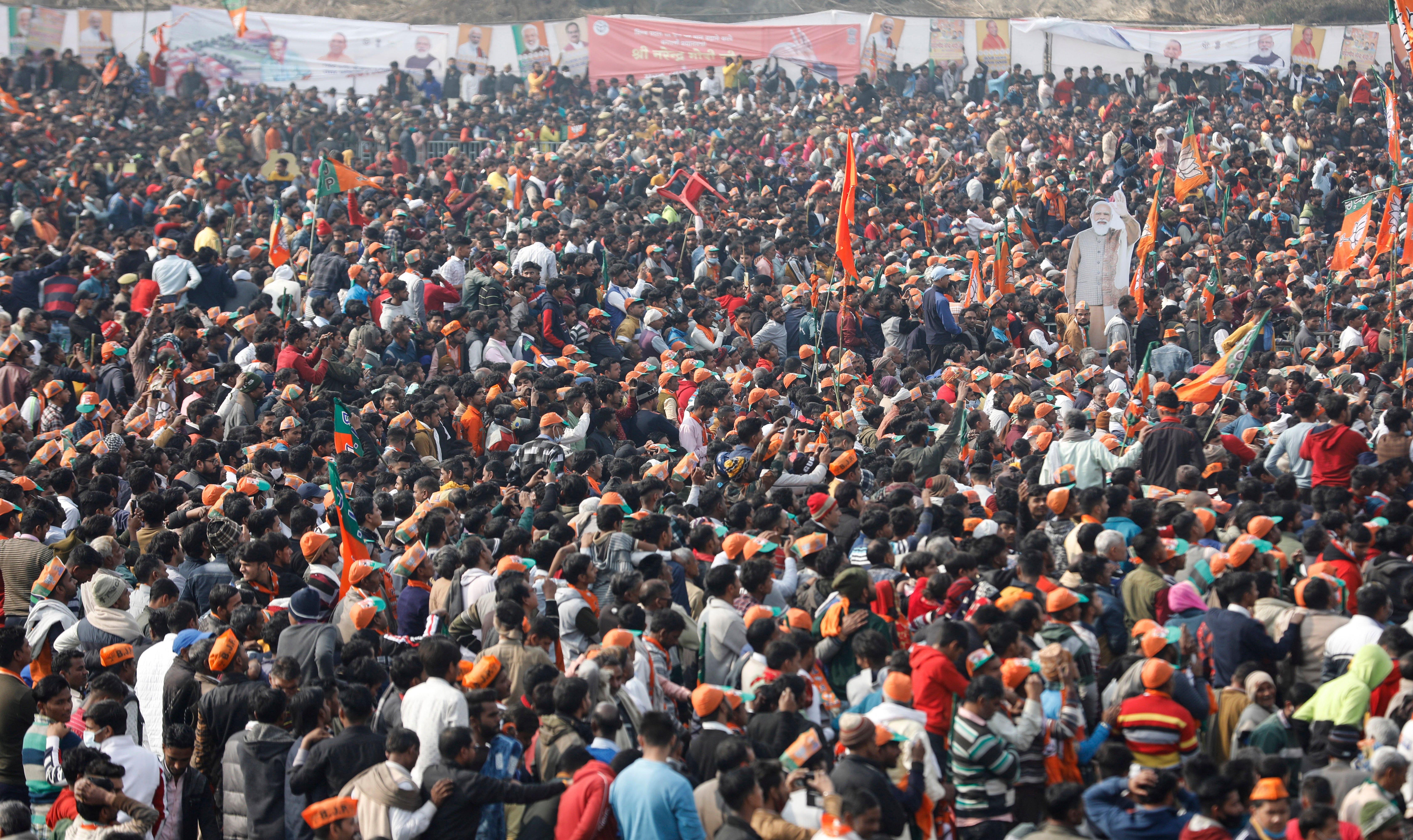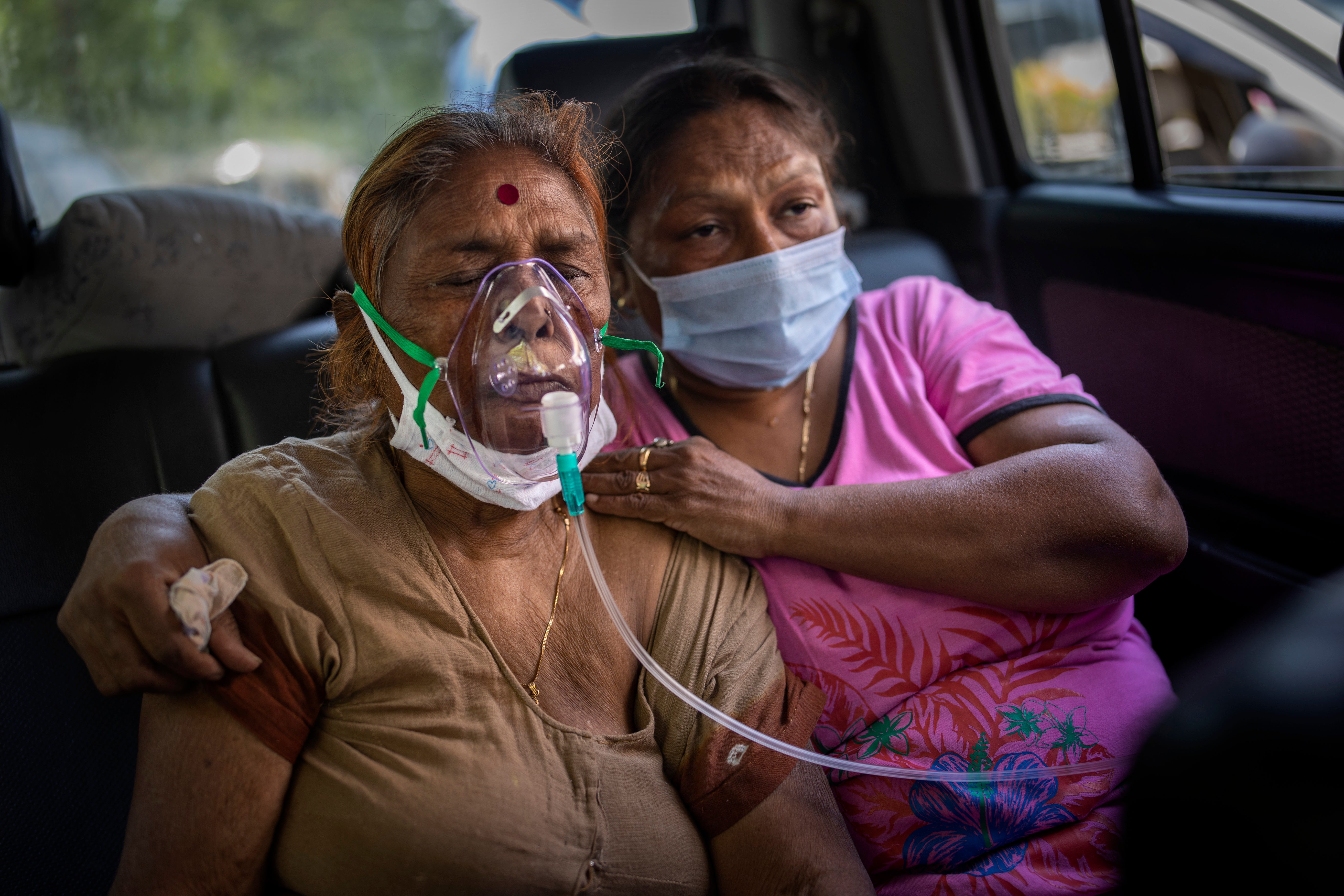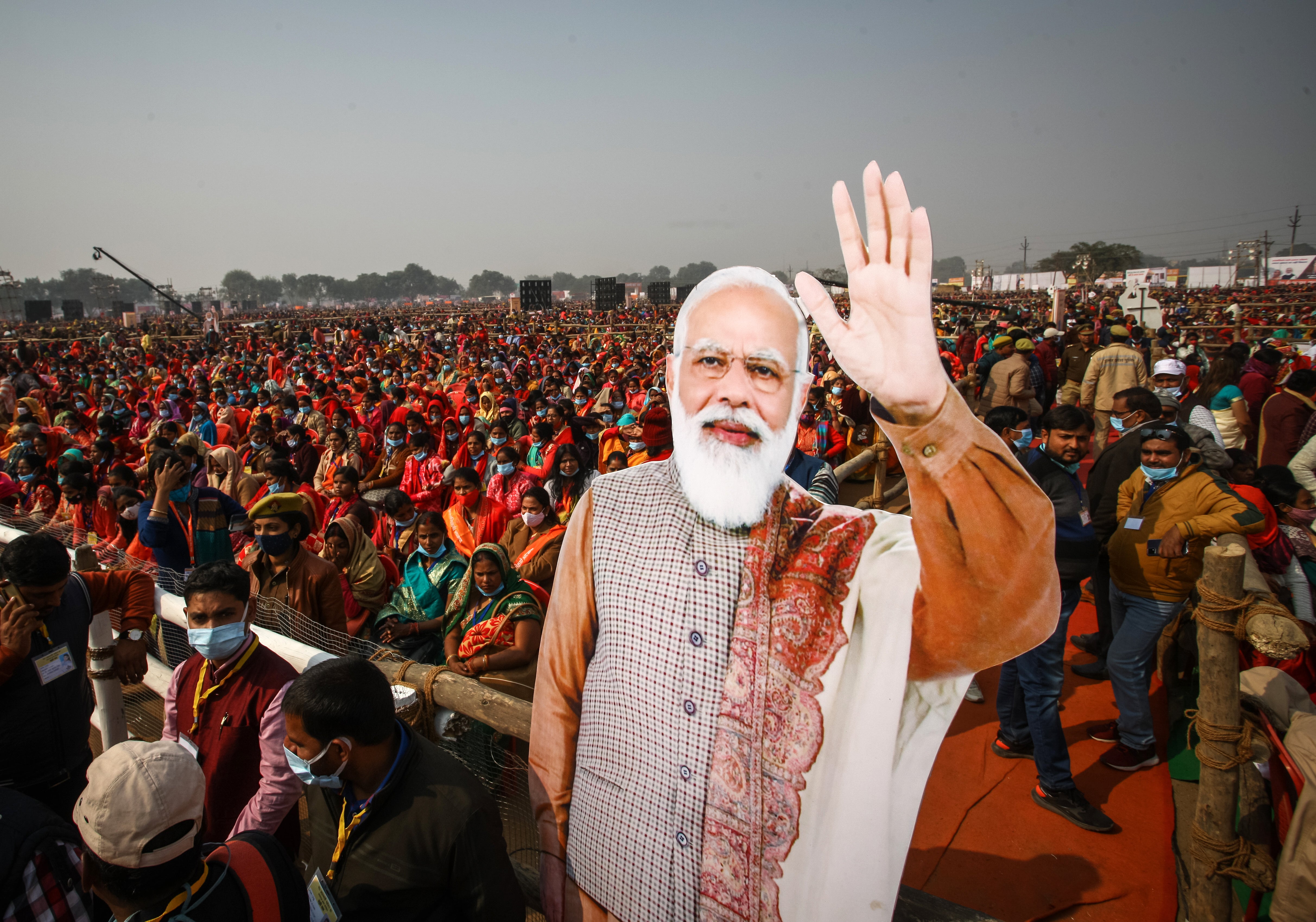Experts call on India to delay major elections as third Covid wave sweeps nation
Public health experts say India risks repeating the same mistakes that came before last year’s devastating second wave if state elections involving 180 million voters go ahead as planned, reports Sravasti Dasgupta

It is nine months since India experienced one of the world’s worst Covid crises, and infections are sweeping across the country again in a third wave. Yet despite the urgings of public health experts, plans are in full swing for five states to go to the polls in key elections next month.
The jarring scene of mass political rallies being staged amid a backdrop of soaring cases is alarmingly reminiscent of the situation in April last year, when daily infections peaked at 400,000 and the healthcare system was brought to its knees. Conservative official figures state that some 240,000 people died.
In India, elections are invariably characterised by large crowds, with mass rallies an essential part of weeks-long campaigning ahead of polling, which can itself last several weeks in large states. Last year’s experience, and the first weeks of campaigning this year, have shown that social distancing is impossible in such contexts, and attempts to encourage mask-wearing fall on deaf ears.
Major rallies have already been held in all five of the states going to the polls in February and March: Punjab, Uttarakhand, Goa, Manipur and Uttar Pradesh, the latter being the most populous in the country and hotly contested. A number of high-profile political leaders, including Delhi’s chief minister, Arvind Kejriwal, have contracted Covid on the campaign trail.
With daily cases now topping 250,000, last week the election commission finally suspended mass rallies , but the move comes too late for many public health experts and there are now mounting calls for the elections as a whole to be delayed until the third wave is over. The start of voting in Punjab has been pushed back — but only by six days.
“From purely a public health perspective, the elections should have been deferred by a month,” says Dr K Srinath Reddy, president of the Public Health Foundation of India.
“Last year we saw assembly polls as well as local body elections before the second wave which allowed the virus to spread,” he tells The Independent. “We must avoid the same mistake again and ensure that the virus doesn’t travel from urban areas to rural areas.”
“There is a need to remain on guard for the next few weeks as the Omicron variant spreads very fast,” he adds. “Even if hospitalisations are less [than during the second wave], the healthcare system will be stressed as more and more people will require medical attention.”
India boosted its capacity to deal with severe Covid cases in the aftermath of the second wave, including in oxygen production and the number of available ICU beds. But questions have been raised over whether enough was done to prevent the rapid transmission of Omicron this time round — particularly given the fact the variant hit several other countries first.

“It appears that our ability to anticipate looking at the rest of the world seems to have been inadequate,” says Dr T Jacob John, one of India’s top virologists and the former head of clinical virology at the Christian Medical College in Vellore.
“We know that the peak will come at the end of January and cases will come down by March, so a better timing for elections would have been then. But in India decisions are not being made with a scientific mindset.”
“It appears that the government’s medical advisers misread the situation while suggesting that the government should go ahead with holding elections,” he adds.
Dr Chandrakant Lahariya, an epidemiologist and expert in public health systems, says that given India is following the same trajectory in rising cases as in other countries affected by Omicron, there is a great deal of urgency to speed up vaccinations.
“What is important is that vaccines save lives and prevent severe disease,” he says. He suggests that if the government insists on going ahead with the elections, efforts to vaccinate the whole population and distribute boosters could be “prioritised in poll-bound states”. “Irrespective of the elections, vaccinations needs to be stepped up,” he says.
India only started offering booster doses to front-line workers and senior citizens on 10 January, and fell short of a goal set out by Narendra Modi’s government to vaccinate the entire adult population by the end of 2021. Currently about 68 per cent of over-18s have had two vaccine doses, or about 46 per cent of the population as a whole.
And a recent analysis by the Mint newspaper found that vaccination rates in three of the five poll-bound states are lower than the national average – only one third of the population have received both doses in Uttar Pradesh, Punjab and Manipur.
Dr John says that there was enough scientific evidence for the government to start its booster programme months earlier, when the WHO first declared Omicron a variant of concern in November. “Many countries swiftly did so because South Africa’s experience showed that Omicron affects the unvaccinated more,” he says.
“Banning rallies now is not good enough. You should have pushed vaccinations earlier,” adds Dr John.
Despite public health concerns, deferring elections is not easy in a country like India where elections are a large-scale exercise spanning various phases of campaigning as well as polling.
Elections require the marshalling of central paramilitary forces, who are deployed by the federal home ministry to prevent political violence. With five states comprising about 180 million eligible voters going to the polls at the same time, the authorities need to carefully manage their resources.
The risks – both in terms of Covid transmission and security – are exacerbated because two of the five states will spread out their voting across multiple polling days, a common practice in Indian elections. In Manipur there will be two election dates while voting in Uttar Pradesh will span seven phases or three-and-a-half weeks.
“While multi-phase polling has its advantages, including reducing the chances of violence, single phase polling, which was the practice earlier, would shorten the period of risk,” says SY Quraishi, a former chief election commissioner of India.
“This was a good opportunity to take the bold decision to bring back single-phase polling.”
Quraishi says the timing of the polling has been dictated by the fact that Goa’s assembly expires on 15 March. “The constitution says that a term of a house cannot be extended beyond its five years except in cases of an emergency – which includes war, external aggression or any internal rebellion,” he says. In other words, extending the term of Goa’s local assembly would require declaring a state of emergency – a step the government would not take lightly.
He suggests that if the votes are to go ahead, the ban on mass rallies should be extended throughout the election period. And with whatever political activity does take place, he says, the onus must be on the various parties contesting the election to ensure there is no crowding, and that other Covid protocols are followed.
The Independent spoke to spokespersons for several of the major parties involved in the five elections, and they all agreed on one thing – that while health concerns remain, democracy cannot be put on hold forever.
Sanjay Mayukh, national spokesperson for Modi’s BJP, which seeks to retain power in four of the five states and make inroads in Punjab, admits that the number of political leaders themselves getting infected is an issue. But he adds that those “who are testing positive are promptly isolating”, rather than spreading the virus.

While Mayukh refused to comment on whether political rallies should be banned for the duration of the election, he says that the BJP will follow the election commission’s guidelines over Covid safety.
“The decision has been taken by the election commission after consulting political parties, who are the representatives of the people,” he says. “We will follow all their protocols.”
Congress, the main national opposition party and the incumbent in Punjab, conceded that the timing is not perfect for conducting elections. But national spokesperson Jaiveer Shergill says that “in a democracy, the electoral process cannot be kept in permanent suspense or infinite abeyance”.
“There definitely should have been an effort by all political parties to reach a consensus on deferring elections, which should have been married with the opinion of medical experts and the election commission. It is a classic case of a glass half full or empty,” he says.
He calls on the election commission to come down heavily “on any party that endangers lives”.
“Strong examples need to be set which act as a deterrence, including but not limited to disqualifying leaders [for] violating protocols. Voters also need to set an example by not being a party to or present at any gathering which puts lives in danger. It takes two to tango,” he adds.
The Independent reached out to Kejriwal’s Aam Aadmi Party, another major national party contesting elections in three of the five states, as well as to the federal health ministry, but did not receive a response before publication.
As things stand, Uttar Pradesh will be the first to go to the polls on 10 February, and then voting will continue on 14, 20, 23, and 27 February, and 3 and 7 March. Uttarakhand and Goa go to the polls on 14 February, while Punjab will now vote on 20 February. The northeastern state of Manipur will vote in two phases on 22 February and 3 March.
Results for all the assembly polls will be declared on 10 March.







Join our commenting forum
Join thought-provoking conversations, follow other Independent readers and see their replies
Comments